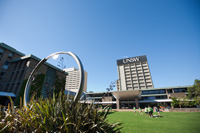This is a shelf course. A shelf course comprises a number of modules related to this broad area of study. Each module is a separate semester of study in this area and is offered in rotation. You can study TWO modules but you cannot study the same module twice.
|
Subject Area: History
Module: "Documentary Film and History" (Summer, 2011)
Documentary film is a dominant form of historical knowledge in today's world. This course explores the ways in which documentary films represent, remember, imagine and find meaning in the past, and their function as "History" in the public sphere. Students will analyse documentary's traditional status as a "truth telling device" in light of similar debates over the nature of history and truth, and explore the tensions between documentary and written histories. The course also addresses the possibilities of the audiovisual archive as a source of historical research, and how the historian-as-documentarian might approach the non-print text as a primary source of historical evidence. Students are encouraged to consider both the limitations and the potential for documentary as a mode of historical production, and what the future holds for history on the screen. What films get made about the past, and when, is an important question for consideration in this course. Topics addressed in this course include the construction of historical memory; ethnography and race; testimony and the historical witness; television histories; historical re-enactment; myth; the audio-visual archive; home movies; found footage; web-based histories, and 'reality' history.
Module: " Empires and States in World History" (Semester 1, 2011)
Empires have dominated much of the world since the Classical Era. States and city-states have have an even longer history. In this course, we consider the nature of empires, and compare traditional with colonial versions, and consider why it is that some (eg. Rome) endured and others (Nazi Germany) failed miserably. We will consider seminal case studies through time.

